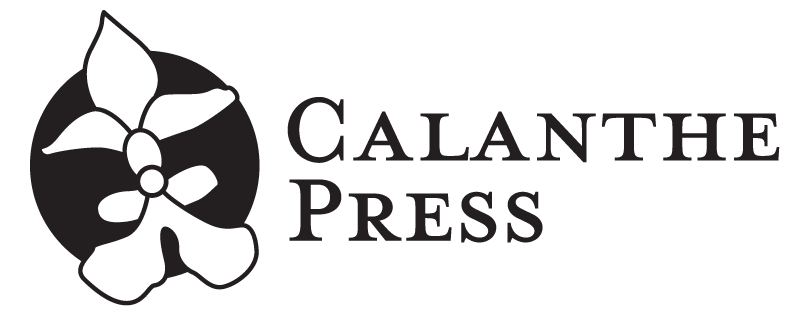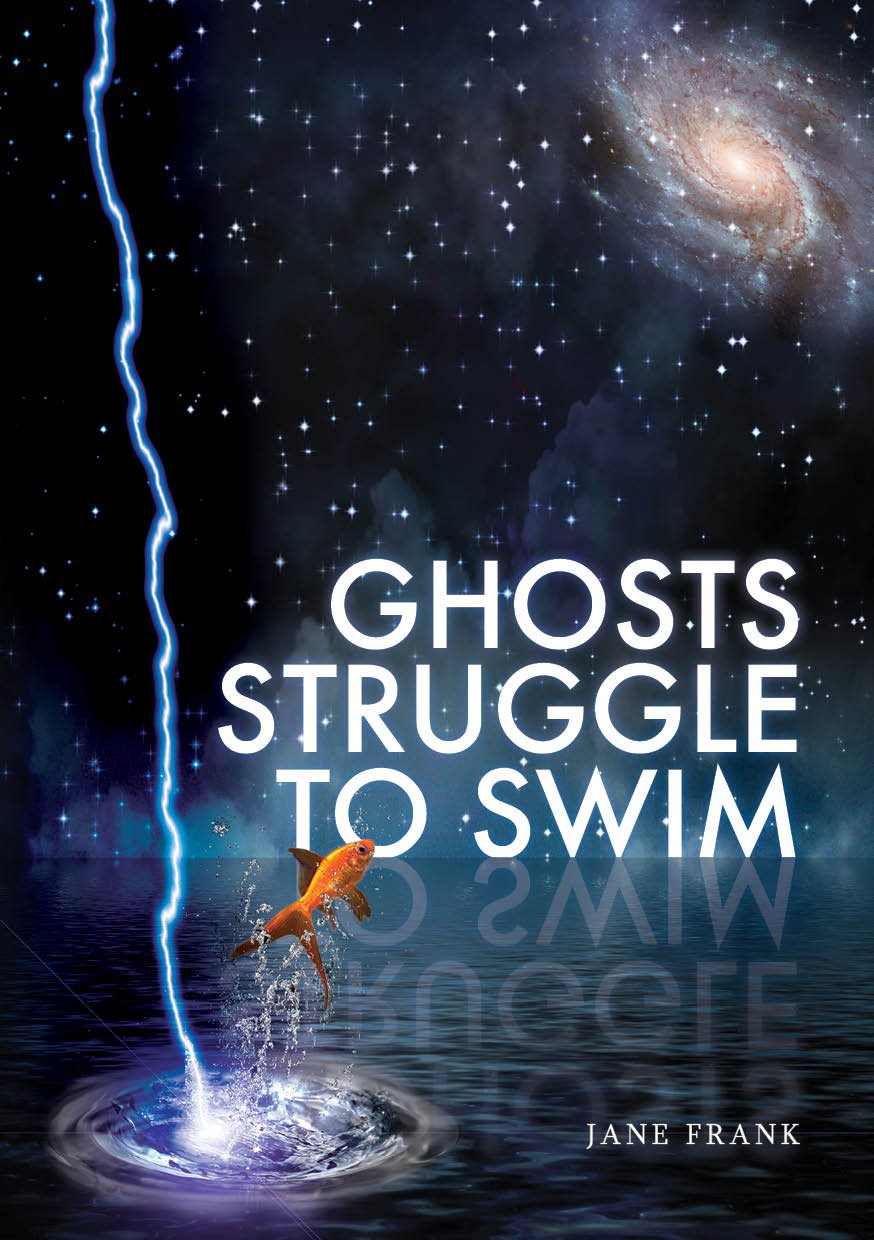Ghosts Struggle to Swim
Jane Frank
In this volume, poetry intertwines with memory to resurrect childhood and the haunting of lost people and dreams.
Poems explore the interplay between our former selves and spectral figures captured in the canvases of history. With vivid imagery and evocative language, the poems in this collection have been described as ‘pictures hung in a gallery.’
-
You once told me rose madder lake was your
favourite colour. I always thought of tranquil
pink water, a canoe being rowed with paint
brushes as oars. You liked —I know —the fugitive
transparency, and showed me the way Turner
used it in his skies, explaining its powers of
granulation. I kept a sample you gave me with
its range of different depths. There’s a photo-
graph of you next to my bed —I’d say you’re
40. I see your cheeks and lips stained rosy
despite the sharp morning light. The mouth of
the Girl with a Pearl Earring was painted madder
lake, but I’ve learned that since. Vermeer used
rose madder to deepen vermilion, to stop the
rich colour fading, to hold memory in place.
-
after Vogelkomödie (Bird Comedy)
I am pasting hieroglyph birds to my favourite tree
like you said. My goals are clearer. The leaves are
glowing like a vision now. Like coral. I am placing
arrows to remind me of the child buried deep. The
birds flew out of the cage this morning when the
sun came up and I followed. All day, they have been
laughing: at palms, at windows and now at the dark.
How can I make these years meaningful? The best
way is to add stars and butterfly wings, sails and
steeples. That’s what you do. Don’t identify obstacles:
avoid them. Good advice. Birds don’t have to be
brave to fly. Watch them. The air catches their
imagination. They ignore trends and insults, migrate
to beautiful places where the trees are rose-coloured.
Have a new set of birds for every day, you say.
Keep smiling. Don’t ever stop painting the birds.
-
I wake when river stones bump against my feet.
The current is strong—sometimes I fear being lost
in the lines the swirling water makes in the dark.
My boys never sleep—they swim in the kitchen, sleek
with their backbones of silver, their tortoiseshell
eyes. They speak in bubbles, dart joyously around,
sway like kelp to Coldplay songs. Sound echoes
off invisible walls. There are caves of cuttlefish stacked
alphabetically and a gleaming floor of shells. Three
giant mantlepiece squid guard a tinderbox that won’t
ever light. There is no way of telling nights apart:
it is all khaki-blue. Floating above like pale
kites—I try not to look—are all the beautiful souls
we’ve known. Is it their memories that keep us from
sleep or the far-off crash of waves?
Wide River
Jane Frank
Witness poetry carrying the weight of memory — a vast current of triumphs and missteps that have shaped the poet’s identity.
This volume reflects on the tapestry of her past that is interwoven with the profound influence of her father, an artist and guiding light. These poems serve as an homage and a reckoning, revealing the intimate journey of loss and love.
-
This evening feels like a date with Braque—
lamplight monochrome, bottle and plate
tessellated, crumpled napkin broken into glass
shards, tablecloth shapes interlocking,
overlapping. Until I ate them, the chicken
and broccoli were perfectly spaced on the plate.
I peeled onions for the sauce that fell in trans-
lucent layers like days, but when I diced them
they became just a formal element on the
page. Even my thoughts are captions in papiers
collés: just words in typed letters like Remember?
and Wouldn’t it be nice? Perhaps it’s a trick
of the light, or wishful thinking, but the salt
and pepper shakers are moving slowly now like
planets to the edges of space, away from
ordered patterns within the confines of this frame.
-
If the door’s open when I lie in the bath, I can see
your painting rinsed in soft louvred light. You
sketched it from the top of the street. I visualize
you still in old corduroys, notebook in hand,
squinting at the sardined houses holding tight to
hills, roofs patchworked in silver and oxblood,
ridges of fig and jacaranda, stephanotis vines
swallowing front fences and lantana-laced
yards where chickens ran among vegetable rows.
-
A bone broken by two people: the holder
of the larger portion wins
no wishbones drying on the window ledge
in this house
the Etruscans were the first to preserve
a bird’s divine powers
as I dried up, I’d rehearse the ritual:
fingers curled lightly around a brittle furcula
dreams of flight: the goose in the company
of gods but why a perfect bone fork?
There was a domestic magic that lifted us—
that extra spring of hold and release
Jane
Frank
Jane Frank is a Brisbane-based poet who is published widely both in Australia and overseas.
She is the author of Ghosts Struggle to Swim (2023) and Wide River (2020), both published by Calanthe Press and Gardening on Mars (Shearsman Books, 2025). Her work is published in journals and magazines such as Australian Poetry Review, Westerly, Antipodes, Meniscus, Shearsman, Other Terrain, Takahe, The Ekphrastic Review, The Mackinaw, MacQueen’s Quinterly, London Grip, Glasgow Review of Books, Plumwood Mountain, Coastlines, Live Encounters, Cordite, StylusLit, Shearsman, Poetry Salzburg Review, Noon, Spelt, The Blue Nib, Hecate, Social Alternatives, Not Very Quiet, Communion, Snorkel, Algebra of Owls, Antiphon, The Bimblebox Art Project and Poetry Ireland Review.
Her poems have also been anthologised in The Liquid Amber Poetry Prize Anthology (2024;2025), ACU Prize for Poetry Anthology (2023; 2024), If Writing Were a Cure: University of Canberra’s Health Poetry Prize Anthology (2024), Grieve (Hunter Writers Centre vols 13, 10, 9, 8) , Heroines: An Anthology of Short Fiction and Poetry (Neo Perennial Press vols 1, 2, 4), Poetry for the Planet: An Anthology of Imagined Futures (Litoria Press, 2021), 100 Poets (Flying Island Press, 2025), The Memory Palace (The Ekphrastic Review, 2024), Australian Poetry Anthology, Newcastle Poetry Prize Anthology (Hunter Writers Centre), Not Very Quiet: The Anthology (2021), the Incompleteness Book II: Writing Back and Thinking Forward (Recent Work Press, 2021), Pale Fire: New Writing on the Moon (The Frogmore Press 2019), Poetry for the Planet (Litoria Press, 2021), Not Very Quiet: The Anthology (Recent Work Press, 2021), Meridian (APWT / Drunken Boat Media 2020), Aiblins: New Scottish Political Poetry (Luath 2017), Heroines: An Anthology of Short Fiction and Poetry (Neo Perennial Press 2018, 2019), Forty Voices Strong: An Anthology of Contemporary Scottish Poetry (University of Wisconsin-Whitewater, 2019), Pale Fire: New Writings on the Moon (The Frogmore Press, 2019), Travellin’ Mama (Demeter Press, 2019), Fiolet and Wing: An Anthology of Domestic Fabulist Poetry (2019), Spectral Lines: Poems about Scientists (Alternating Current Press, 2019), Dragons of the Prime (The Emma Press, 2019) and ITWOW International (2016).
Her poems have won, been placed or shortlisted for awards including the ACU Poetry Prize, the Newcastle Poetry Prize, The Arts Queensland Philip Bacon Ekphrasis Prize, The University of Canberra Health Poetry Prize, Wigtown International Poetry Prize, The Poetry d’Amour Poetry Prize, the Liquid Amber Poetry Prize and Monica Taylor Poetry Prize. She has twice been shortlisted for the Thomas Shapcott Poetry Prize for an unpublished manuscript— in 2020 for Wolf Moon, and in 2016 for Dancing with Charcoal Feet.
During the COVID-19 Pandemic, she participated in two poetry series: Hugh McMillan’s Pestilence Poems, and Queensland Poetry Festival’s Panacea Poets. She was a feature poet at StAnza International Poetry Festival (in Scotland) in March 2021.
She lectures in the School of Business and Creative Industries at the University of the Sunshine Coast where her research explores poetics, cultural sociology and the ongoing significance of books in the Digital Age. Her academic monograph Regenerating Regional Culture: A Study of the International Book Town Movement was published in 2017 by Palgrave Macmillan. It was adapted from her doctoral thesis of the same name submitted in the School of Humanities, Languages and Social Science at Griffith University.She is Reviews Editor for StylusLit Literary Journal; and, as well as poetry, enjoys walking Comet, her black Labrador, by the sea.
Follow Jane at: https://janefrankpoetry.wordpress.com/ and https://www.facebook.com/JaneFrankPoet/



